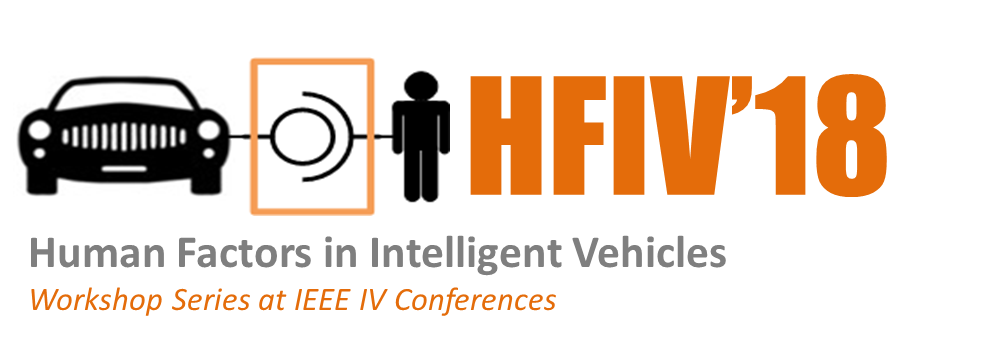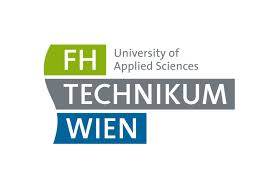Welcome to the Workshop on Human Factors in Intelligent Vehicles in its 7th edition.

This workshop is promoted by IEEE ITS Society’s Technical Activities Committee on Human Factors in Intelligent Vehicles (TC on Human Factors in ITS) . This year the Workshop on Human Factors in Intelligent Vehicles will be a joint event with the Workshop on Human Machine Interfaces in Intelligent Vehicles.
The workshop will take place at "Changshu International Hotel (Congress Venue)" in Changshu, Suzhou, China, on Tuesday June 26, 2018.
It is the 7th edition to be co-placed with the IEEE Intelligent Vehicles Symposium, June 26 - 30, 2018.
Aim and Scope
The IEEE Workshop on Human Factors in Intelligent Vehicles (HFIV’18) is allocated with the IEEE 29th Intelligent Vehicles Symposium, to be held in Changshu, Suzhou, China, June 26 - 30, 2018 and it is the 7th edition of its series.
The HFIV’18 welcomes and encourages contributions reporting on original research, work under development and experiments of different fields related to Human Factors.
It aims to foster discussion on issues related to the analysis of human factors in the design and evaluation of intelligent vehicles technologies, in a wide spectrum of applications and in different dimensions. It is expected to build upon a proper environment to disseminate knowledge and motivate interactions among the technical and scientific communities, practitioners and students, allowing state-of-the-art concepts and advances to be further developed and enhanced.
Intelligent vehicles (IV) technologies have experienced a great improvement in the last couple of decades, turning vehicles into more interactive counterparts in transportation and mobility systems. However, analyzing the impact of such technologies on traffic awareness for the drivers and their behavior towards improving driving performance while reducing road accidents as well as psycho and physical exhaustion still demands proper tools and approaches.
Whereas the feasibility of incorporating new technology-driven functionalities to vehicles has played a central role in the automotive design, not always safety issues related to interaction with the new in-vehicle systems have been taken into consideration. Additionally, other aspects are equally important and need to be accounted for, such as the impact technologies that support specific driving functions play on the primary task of driving the vehicle, as well as their impact on overall performance of transportation systems. Besides current industrial achievements that feature today’s vehicles with a number of important driving assistance systems, the perspective of autonomous driving vehicles populating urban settings pose even more challenging issues.
Also, the information and functionalities that rely on new ways of communication have to be presented in a non-intrusive way while complying with specific design requirements. A system that guarantees efficiency of use, comfort and user satisfaction is inarguably an important contribution towards a more conscious driving behavior that directly results from the adoption of IV technologies.
Topics of Interest
Some topics of interest include (but are not limited to) the following:
- Intelligent user interfaces
- Human-machine interaction
- Human-in-the-loop simulation
- Cognitive aspects of driving
- Interaction with Autonomous Vehicles
- Human behavior and capability, affecting system’design and operation
- Data sources, naturalistic data and synthetic data
- Behavior Modeling, Simulation and Analysis
- Methodologies to optimize overall system performance
- Tools and approaches to analyze human factors
- Ergonomics of traveler information systems
- Anthropometric layout of vehicular technical systems
- Mixed Reality
- Cross-Cultural Design
- Augmented Cognition
- User Experience and Usability
- User Interfaces for Autonomous Vehicles
- Computer Aided Ergonomics Analysis
- Effects of in-vehicle systems on driver performance
- Tools and methodologies for usability assessment
- Input/Output modalities in system ergonomic design
- Learning, Anticipation, and Adaptation balance
- Methodologies for driver training
Paper Submission and Publication
Prospective authors are invited to submit contributions reporting on their current research and ideas that motivate discussion during the workshop. Each paper will be analyzed by an International Program Committee according to quality of presentation, relevance and potential contribution.
Accepted papers will be included in the conference proceedings and will be indexed in the IEEE Xplore Digital Library. Authors must follow the IEEE Conference format in the preparation of their manuscripts of maximum 6 pages in standard IEEE double column PDF format and submit them through the conference submission system for peer-review by the International Program Committee. All accepted papers will imply that at least one of the co-authors attends the workshop to present the work. Authors will be given a certain time to orally present their papers and discussion will be actively motivated among attendees.
Detailed submission instructions can be found on the Workshop Web site at HFIV’18, under the Submissions option.
Important Dates
Manuscript submission
HFIV’18 Workshop
IEEE IV’18
Oganizing Committee
Dr. C. Olaverri-Monreal, University of Applied Sciences Technikum Wien, Vienna, Austria
Dr. K. Nakano, The University of Tokyo, Japan
Dr. X. Ji, Tsinghua University, China
Dr. H. Hu, Jilin University, China
Dr. R. Zheng, Dalian University of Technology, China
Manuscript preparation
The 7th HFIV Workshop welcomes contributions within the scope and topics of the forum. While preparing your manuscript, please do follow the same formatting guidelines specified by IEEE IV’18 main conference standard IEEE double column PDF of maximum 6 pages. Further, due to space constraints on the proceedings of the conference, all papers are limited to 2 MB and should preferably be less than 500 kB.
For the final version of the papers, please use Word or Latex templates and submit the pdf file through the Papercept tool.
Further details on formatting, frequently asked questions and templates are available on the Conference Web Site.
Manuscript submission
Contributions must be electronically submitted in PDF files only, via the conference submission system for peer-review by the International Program Committee.
Please, to upload your paper follow the procedure below:
1. Log into the Papercept tool.
2. Select the Workshop Human Factors in Intelligent Vehicles or the Workshop on Human- Machine Interface in Intelligent Vehicles
3. Specify the correspondent code number for the Workshop on Human Factors in Intelligent Vehicles: d114h or 9wf53 respectively.
Reviewing process
Each manuscript submitted to HFIV’18 will undergo a peer-reviewing process by at least three members of the International Programme Committee to ensure accepted papers will be of great interest and motivate an open and broad discussion among the audience. Contributions will be reviewed according to relevance to HFIV’18, originality and novel ideas, technical soundness and quality of presentation. Given the nature and aims of the forum, undergoing projects bringing into discussion state-of-the-art and cutting-edge ideas and novel trends are highly encouraged.
Authors of accepted papers must follow and carefully consider reviewers’ comments, guidelines, and suggestions during the preparation of their camera-ready version for inclusion in the workshop proceedings in a digital format.
Publication
Accepted papers will be included in the conference proceedings and will be indexed in the IEEE Xplore Digital Library.
All accepted papers will imply that at least one of the co-authors attends the workshop to present the work.
Authors will be given a certain time to orally present their papers and discussion will be actively motivated among attendees.
Camera-ready manuscripts must be submitted by Apr, 8, 2018.
Conference Program
The workshop will take place on Tuesday June 26, 2018 at Changshu, Suzhou, China.
You can access the IEEE IV'18 conference program through the Conference Web Site.
Final Program
| 8:30am-9:00am | "Automatic Analysis of Pedestrians Body Language in the Interaction with Autonomous Vehicles "; Morales-Alvarez, Walter; Gomez, Maria Jose; Fernandez, Gerardo; Garcia, Fernando; Olaverri-Monreal, Cristina | 9am-9:30am | "Real-time Traffic Scene Segmentation Based on Multi-Feature Map and Deep Learning "; Linhui, Li; Zheng, Weina; Kong, LingChao; Ozguner, Umit; Hou, Wenbin; Lian, Jing |
| 9:30am-10:00am | "A biosignal based driving experience analysis for curve road" ; HU, Hongyu; Gao, Zhenhai; Yuhuan, Sheng; Naixuan, Zhu; Zhang, Yichi; Zhang, Jin |
| 10:00am-10:30am | Coffee break |
| 10:00am-11:00am | "Analysis of Driver Behaviors while Using In-Vehicle Traffic Light with Partial Deployment of V2I Communication”; Yang, Bo; Zheng, Rencheng; Kaizuka, Tsutomu; Nakano, Kimihiko |
| 11am-11:30am | "An Application of Particle Swarm Algorithms to Optimize Hidden Markov Models for Driver Fatigue Identification”; Zhang, Mingheng; Zhai, Xiaojuan; Zhao, Guang; Chong, Tonghong; Wang, Zheng | 11:30am-12:00am | “Longitudinal Control Strategy of Collision Avoidance Warning System for Intelligent Vehicle Considering Drivers and Environmental Factors”; Zhao, Yibing; Xiang, Xiumei; Zhang, Ronghui; Guo, Lie; Wang, Zheng |
| 12:00pm-1:30pm | Lunch |
| 1:30pm-2:00pm | “Application of Stackelberg Game Theory for Shared Steering Torque Control in Lane Change Maneuver”; Yang, Kaiming; Zheng, Rencheng; Ji, Xuewu; Nishimura, Yosuke; Ando, Kazuya |
| 2:00pm-2:30pm | “Driver-automation shared control: Modeling driver behavior by taking account of reliance on haptic guidance steering”; Wang, Zheng; Zheng, Rencheng; Kaizuka, Tsutomu; Nakano, Kimihiko |
| 2:30pm-3:00pm | “The Impact of Explanation on Possibility of Hazard Detection Failure on Driver Intervention under Partial Driving Automation”; Liu, Tianwei; Zhou, Huiping; Itoh, Makoto; Kitazaki, Satoshi |
| 3:00pm-3:30pm | Coffee break |
| 3:30pm-4:00pm | “Analysis on Biosignal Characteristics to Evaluate Road Rage of Younger Drivers: A Driving Simulator Study”; HU, Hongyu; Zhu, Zheng; Gao, Zhenhai; Zheng, Rencheng |








